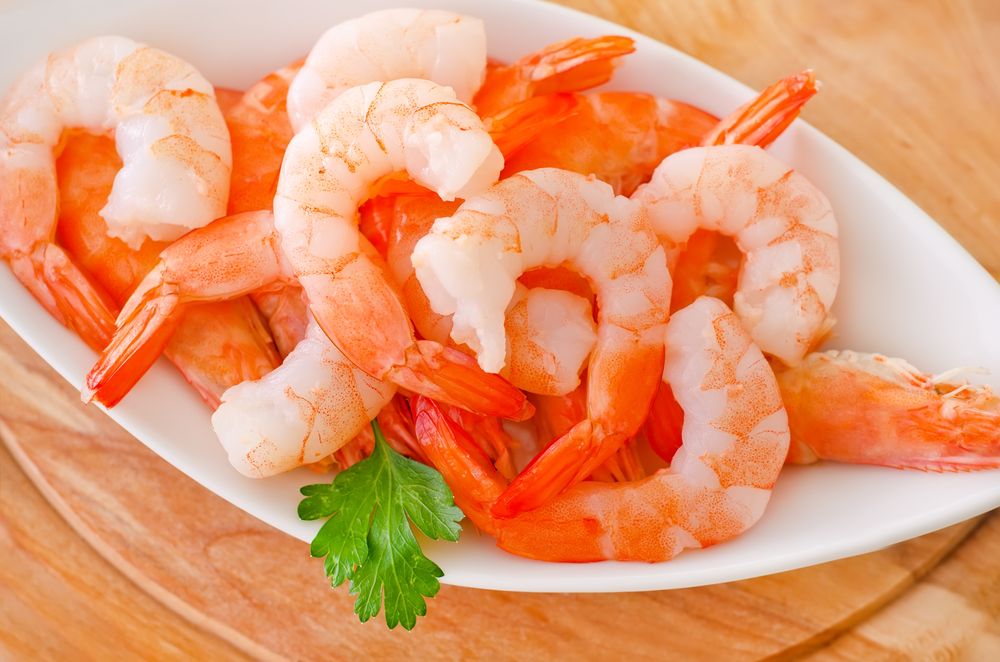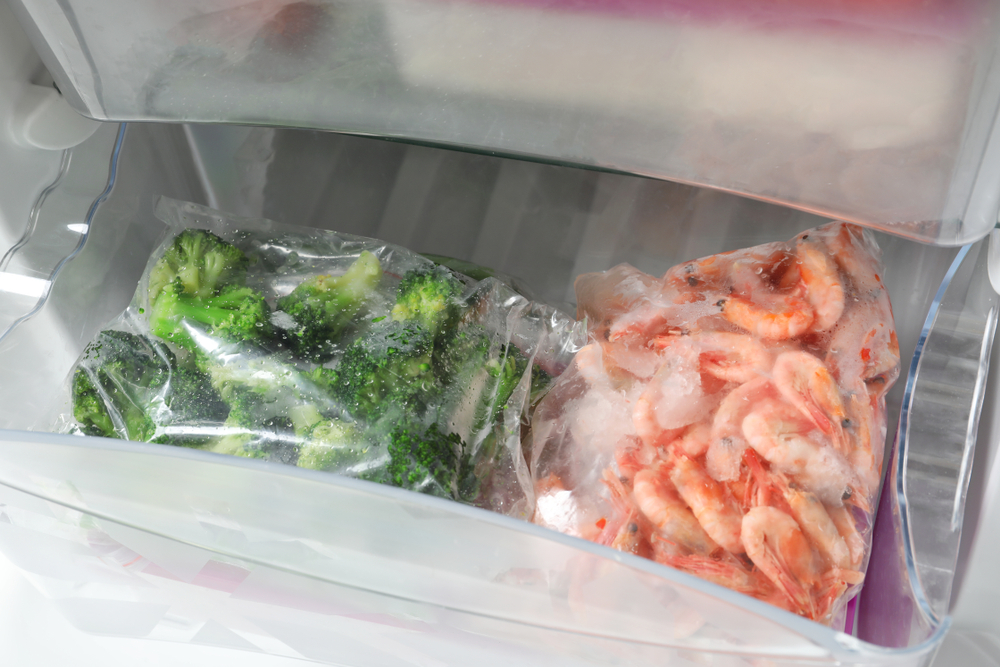Yes, you can freeze cooked shrimp for 10 – 12 months. In fact, many grocery stores sell pre-cooked shrimp that you simply need to thaw before eating.
If you cooked shrimp in the shell that you want to freeze, it’s best to leave the shell on. That’ll help the shrimp retain its flavor and provides an extra buffer against air accessing the meat while it’s in the freezer.
You should also cook and freeze your shrimp shortly after buying it. That way, it’ll maintain better freshness and texture in the freezer.
Freezing cooked shrimp is an excellent way to save your leftovers. It doesn’t require complicated preparation before freezing and has a lifespan of up to one year in your freezer. Best of all, cooked shrimp comes out of the freezer with a delicious taste and excellent flavor.

How to Freeze Cooked Shrimp
Learning how to freeze shrimp is easy, but you need to take a few essential steps to maximize the shrimp’s freezer life.
If you already know that you won’t be eating all the shrimp that you’ll be cooking, it’s best to follow the steps below immediately. Otherwise, do so as soon as you know that you’ll have leftover shrimp.
Step 1: Clean and Cook the Shrimp:
Your future self will thank you for taking the time to clean your shrimp before you cook and freeze them. If the veins of your shrimp are still intact, now is the time to remove them if they make you queasy to eat.
Then, cook the shrimp as you would for eating them on the spot. You can freeze shrimp using any cooking method, so feel free to boil, grill, or any other favorite technique you have.
Step 2: Let the Shrimp Cool:
Cooling shrimp is one of the most critical steps. If you put your shrimp in the freezer while they’re still warm, they’ll emit steam which can cause a freezer burn-like coating over the top of them.
To speed up the cooling process, we recommend setting your shrimp on a cooling rack.
Step 3: Dry the Shrimp:
You want to avoid as much moisture as possible when freezing your shrimp. So, pat them dry with a paper towel or cloth. That will prevent them from freezing together while in storage, and it’ll help maximize their flavor retention.
If you want to go above and beyond with preventing your shrimp from sticking together, lay them on a baking tray. Make sure none of the shrimp are touching, then place the tray in the freezer for around 15 minutes. After that time, pull the tray out and move to the next step.
Step 4: Pull Out Your Vacuum Sealer or Freezer Bags:
Using a vacuum sealer or bags designed for freezers is crucial when freezing cooked shrimp because they have more airtight properties than other types of bags. If oxygen ends up reaching your shrimp while in the freezer, the shrimp will take on a duller color and lose its flavor, which is freezer burn.
So, to prevent freezer burn, use a vacuum sealer. Alternatively, you can manually squeeze out as much air as possible from a freezer bag once you pack it with shrimp. It’s even a good idea to double bag the shrimp. Although it’s safe to eat cooked shrimp with freezer burn, it ruins the taste experience.
Step 5: Label the Bag:
Cooked shrimp won’t last forever in your freezer, so it’s essential to mark the bag with the date that you first put it in there. If you enjoy keeping an organized freezer and freeze cooked shrimp often, you can even order the bags according to the date you put them in there.
How Long Does Cooked Shrimp Last in the Freezer?

Now that you know how to store cooked shrimp in the freezer, you might be wondering—how long is cooked shrimp good for?
As a general rule, you can expect your cooked shrimp to stay good in the freezer for 10 – 12 months.
Can you safely eat it after that time? Most likely. However, it’ll start losing its flavor and texture.
When storing cooked shrimp in the freezer, it’s important to note that you should never thaw and refreeze shrimp that’s been out of the refrigerator for more than two hours. For this reason, it’s helpful to ensure the shrimp don’t stick together so that you can easily remove the exact amount you want to eat.
Once you’re ready to eat your frozen shrimp, you have two options for thawing them. The first is to set the bag of shrimp in your freezer. You’ll need to leave it there for about 12 hours, and you should eat the shrimp within 48 hours to avoid bacteria building up.
Alternatively, you can use a quick defrosting method by letting the bag of shrimp sit in a cold tub of water. Within an hour, you’ll have shrimp that are ready to eat.
When thawing frozen cooked shrimp, it’s important to note that direct contact with water can reduce the shrimp’s flavor and texture. Therefore, you should leave the shrimp in its bag until you’re ready to eat them.
How to Tell if Frozen Cooked Shrimp is Bad
Let’s start with this—your shrimp will come out of the freezer the same way they went into it. So, if you put cooked shrimp that are on the verge of turning bad into your freezer, they’ll be in that same state when you thaw them.
Even if you freeze freshly cooked shrimp, though, certain situations can make the shrimp go bad. You’ll know that your shrimp are bad if you see the following signs:
- A strong, off-putting smell
- Slimy texture
- Greyish color
- Sour taste
You might be wondering—what can cause frozen cooked shrimp to go bad?
Most commonly, it happens from a power outage or faulty freezer. Your freezer should always remain at or under 0 degrees Fahrenheit. Bacteria start thriving at temperatures above 40 degrees, but even so, the freezing and thawing nature of power outages and faulty freezers can cause taste and texture issues with your shrimp.
Frozen Cooked Shrimp Recipe Ideas
Unlike many frozen goods, cooked shrimp maintains an excellent texture in the freezer as long as you follow the freezing steps we covered above. Therefore, you can easily pull a bag out of the freezer and enjoy eating the shrimp with cocktail sauce.
Remember, you can freeze cooked shrimp with or without the shell on. When possible, we recommend freezing shrimp with the shell on if you plan to eat them straight from the bag since they often retain a better flavor that way.
When using frozen cooked shrimp in recipes, it’s important to take care when you add the shrimp. Since you’re working with cooked shrimp, you only need to heat them.
Stir-fries and stews are a great use of cooked shrimp. Just make sure to add the shrimp last and ensure the heat isn’t too high. You can also use frozen cooked shrimp in pasta dishes like shrimp scampi, fried rice, and cold salads.
Frequently Asked Questions About Freezing Cooked Shrimp
If you still have questions about freezing cooked shrimp, take a look at our answers below:
You can freeze and reheat cooked shrimp, although it’s best to let it thaw first. That way, you won’t add unwanted water content to the dish you’re making.
The best way to freeze cooked shrimp is by using a vacuum seal. That reduces the chance of freezer burn and helps the shrimp to maintain its moisture and texture. You can also mimic the vacuum seal process by placing the shrimp in freezer bags and squeezing out the air.
You should let the frozen shrimp thaw before cooking them by placing the shrimp bag in a pan of cold water. Then, add the shrimp to a pan with oil or to a recipe of soup or pasta. You can also microwave the shrimp on high for about one minute, being careful not to overcook it.
You can season frozen cooked shrimp the same way you would fresh shrimp. So, eat them with cocktail sauce or douse them in a seasoning mixture.
Yes, you can saute frozen shrimp. However, you should let them thaw first to avoid overcooking them.






